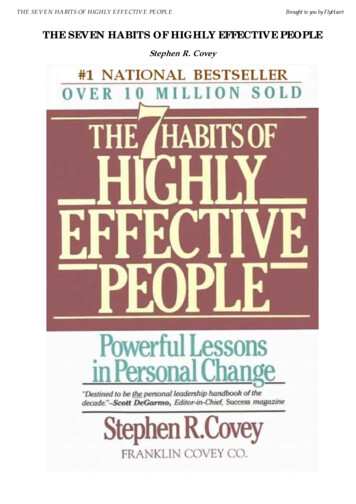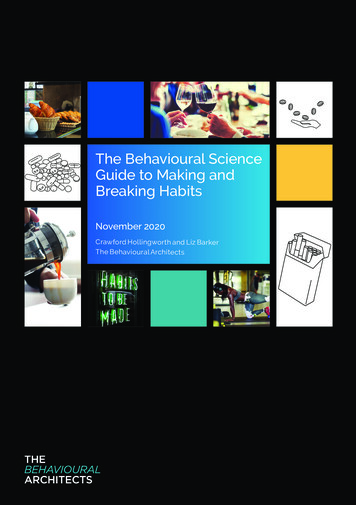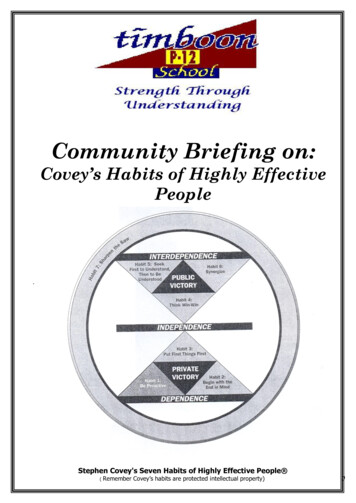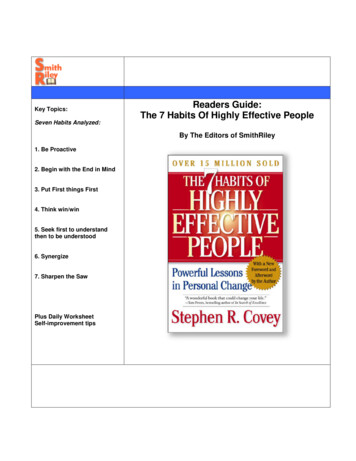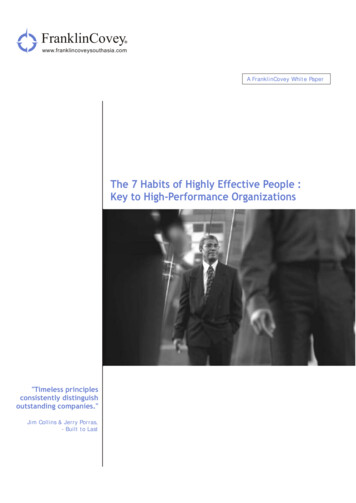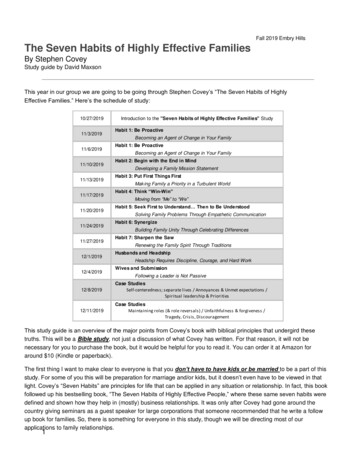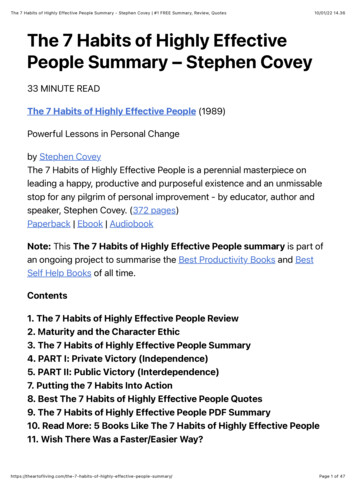
Transcription
The 7 Habits of Highly Effective People Summary - Stephen Covey #1 FREE Summary, Review, Quotes10/01/22 14.36The 7 Habits of Highly EffectivePeople Summary – Stephen Covey33 MINUTE READThe 7 Habits of Highly Effective People (1989)Powerful Lessons in Personal Changeby Stephen CoveyThe 7 Habits of Highly Effective People is a perennial masterpiece onleading a happy, productive and purposeful existence and an unmissablestop for any pilgrim of personal improvement - by educator, author andspeaker, Stephen Covey. (372 pages)Paperback Ebook AudiobookNote: This The 7 Habits of Highly Effective People summary is part ofan ongoing project to summarise the Best Productivity Books and BestSelf Help Books of all time.Contents1. The 7 Habits of Highly Effective People Review2. Maturity and the Character Ethic3. The 7 Habits of Highly Effective People Summary4. PART I: Private Victory (Independence)5. PART II: Public Victory (Interdependence)7. Putting the 7 Habits Into Action8. Best The 7 Habits of Highly Effective People Quotes9. The 7 Habits of Highly Effective People PDF Summary10. Read More: 5 Books Like The 7 Habits of Highly Effective People11. Wish There Was a Faster/Easier hly-effective-people-summary/Page 1 of 47
The 7 Habits of Highly Effective People Summary - Stephen Covey #1 FREE Summary, Review, Quotes10/01/22 14.36The 7 Habits of Highly Effective People ReviewThe 7 Habits of Highly Effective People has sold millions of copies since1989 and is among the most influential personal development books of alltime. And though it would be easy to mistake for just-another-collection oflife-hacks – it’s anything but.The 7 Habits is a perennial masterpiece on leading a happy, productiveand purposeful existence. It’s a full-featured manual for life.The good news? As full-featured manuals go, it’s astoundingly easy toread. Stephen Covey was a preacher, professor, doctor of religiouseducation, Harvard MBA, entrepreneur and leadership coach – collectingscores of clients across countless seminars and engagements. Thesediverse experiences are essential to his ability to teach with coherenceand clarity.That said, The 7 Habits is not an ‘easy-read’. The book is densely seamedwith concepts and frameworks. Its chapters brim with mind-opening,perspective-tilting principles. And there’s no avoiding the chestclenching, ground-shifting challenges Covey constantly issues to searchwithin, reflect deeply and make basic changes to your life.Fortunately, those challenges are peppered with practical pointers. AndCovey brings warmth and wit to his wisdom with rich profiles from hispersonal and professional pasts. As well as the roles above, Stephen andAnne Covey raised 9 children; one of whom penned the book’s rhapsodicpreface and thanks to whom he once earned a national award forfatherhood. The result is a handbook that never fails to connect or tocharm as it carries its contents to term.The short story is thus: Covey’s 7 Habits is among the most impactfuland practical books I’ve yet read. If you haven’t read it, read it. If you haveread it, consider reading it again. Whether you’ve figured it all out highly-effective-people-summary/Page 2 of 47
The 7 Habits of Highly Effective People Summary - Stephen Covey #1 FREE Summary, Review, Quotes10/01/22 14.36or you know you have changes to make, this book is an unmissable stopfor any pilgrim of personal improvement.Maturity and the Character EthicCovey developed his 7 Habits in response to the progressively popularcult of ‘Personality Ethic’: a philosophy, he proclaims, that promises fool’schange from the outside in; a false-messiah of faking it, without making it;a siren’s call to those who would have without being or doing.The alternative? A philosophy of ‘Character Ethic’: a philosophy thatchampions change from the inside out; an approach that starts withidentifying universal principles; a method of choosing values that alignwith those principles; and a way to put those values and a definitepurpose at the heart of our habits, actions and reactions.A central theme in Covey’s philosophy is one of maturation. At any time,we are somewhere between dependence (relying on others),independence (relying on ourselves) and interdependence (collaboratingwith others to achieve more than we can alone). What’s more, thismaturity takes place in five areas: physical, mental, emotional, spiritualand financial (a helpful extension of the physical).The catch? There’s no skipping from dependence to interdependence.Dependence means working with others because we need them.Interdependence means working with others because we choose to. Wemay be financially and physically independent, but if our emotionalwellbeing still hangs on factors and people beyond our control we willalways work with one eye on ourselves. That is what holds us back fromthe full power of creative collaboration. That is why independence comesfirst.Covey’s ultimate goal in The 7 Habits of Highly Effective People is to helpus mature in each of these areas. Only then, he argues, can we highly-effective-people-summary/Page 3 of 47
The 7 Habits of Highly Effective People Summary - Stephen Covey #1 FREE Summary, Review, Quotes10/01/22 14.36basic needs with self-actualisation. Only then can we replace selfactualisation with self-transcendence. Only then can we reach ourpotential as fully functional members of an interdependent society.The 7 Habits of Highly Effective People SummaryIn line with this aim, the book’s 7 habits are structured in 3 parts:Reward: Self-confidence and self-knowledge.1.Personal Vision2.Personal Leadership3.Personal ManagementReward: Rebuild and improve relationships.4.Interpersonal Leadership5.Empathic Communication6.Creative CooperationReward: Sustainable growth.7.Balanced Self RenewalPART I: Private Victory its-of-highly-effective-people-summary/Page 4 of 47
The 7 Habits of Highly Effective People Summary - Stephen Covey #1 FREE Summary, Review, Quotes10/01/22 14.36The rewards of Habits 1 – 3 are the tools of independence. From selfknowledge comes awareness and proactivity. From principles comewisdom and conscience. From faith in our values and our purpose, wedraw clarity, confidence and power. Through effectiveness and efficiency,we lay the foundations to stand on our own.HABIT 1: Be Proactive“There is a gap between stimulus and response and the key to bothour growth and happiness is how we use that space.”If Habits 1 – 3 are about achieving independence and private victory, Habit1 is about taking full ownership of that victory. It says you are the architectof your life.At its core are the following principles:1. After each stimulus (a sensation, emotion or thought) comes aresponse (more sensation, emotion or thought – including intentionsto act).2. By default, our response is determined by instinct, memory andhabit; but3. Before each response comes a gap in which the conscious mind canintervene.What we do with this gap determines the ownership that we take of ourlives and the ownership we take of our lives ultimately dictates our growthand happiness.Why? The answer lies in our choice to live in our Circles of Influence orour Circles of Concern.CIRCLES OF INFLUENCE VS. CIRCLES OF CONCERN“God grant us the serenity to accept things we cannot change, ly-effective-people-summary/Page 5 of 47
The 7 Habits of Highly Effective People Summary - Stephen Covey #1 FREE Summary, Review, Quotes10/01/22 14.36courage to change things we can, and the wisdom to know thedifference.” – Alcoholics AnonymousOur Circle of Influence contains everything in life we can change. OurCircle of Concern contains everything in life we cannot.Things in our Circle of Influence include:Our direct actions and reactions to the world around us; andOur indirect actions through influencing others.Things in our Circle of Concern include:The past;Immediate consequence; andThe actions of most other people.Our Circle of Concern is important to be aware of but miserable to live in.It’s where time, energy and striving dash themselves on things we can’tchange. It uses language like “I can’t”, “I have to” and “if only”.Our Circle of Influence is a realm of proactive and productive will. It’ssmaller than our Circle of Concern but it’s where we focus on what we cando, now and how – no matter how limited or trivial those things seem. It’sa world that uses language like “I can”, “I will” and “I prefer”.We spend time in and grow our Circle of Influence in two ways:1. Subjectively – by always refocussing on the things we control; and2. Objectively – by improving our ability to directly (Habits 1 – 3) andindirectly (Habits 4 – 6) control the world around us.Covey’s advice on our Circle of Concern is clear: if something results froman error you’ve made – acknowledge it, correct it, learn from it and moveon. Otherwise develop the habit of eliminating, ignoring or accepting hly-effective-people-summary/Page 6 of 47
The 7 Habits of Highly Effective People Summary - Stephen Covey #1 FREE Summary, Review, Quotes10/01/22 14.36you cannot control. Refocus your attention on the things that you can.THE FOUR BASIC HUMAN ENDOWMENTSBut how? If taking ownership and being proactive is so easy, why canmoving forward feel so hard?The bad news? Intervening in the gap between stimulus and response ishard. It calls heavily on our four basic human endowments:Self-awareness – the ability to see the gap; to perceive and evaluateour own behaviour.Imagination – the ability to fill the gap; to envision futures that differfrom the one dictated by habit.Conscience – the ability to weigh the vision; to sense what is rightfrom what is wrong.Independent-will – the ability to choose our response; to makeprinciples work for us or against us.The good news? Ownership is a habit that anyone can develop. Andthere’s no better way to begin than to HABIT 2: Start With the End in Mind“If your ladder is not leaning against the right wall, every step you takegets you to the wrong place faster.”Where Habit 1 tells us we are the architects of our lives, Habit 2 tells usWhat to build with that ownership and Why.DOING THE RIGHT THINGAt the heart of personal productivity are efficiency and effectiveness:Efficiency is doing things right (we’ll come to it in Habit s-of-highly-effective-people-summary/Page 7 of 47
The 7 Habits of Highly Effective People Summary - Stephen Covey #1 FREE Summary, Review, Quotes10/01/22 14.36Effectiveness is doing the right thing (the focus of this habit, Habit2).Being effective is hard because it demands maturity from four differentfactors:1. Guidance – clarity of direction and purpose; the ability to choose adefinite desired outcome.2. Wisdom – perspective, understanding and judgement; the ability tochart the best course toward that outcome.3. Power – the capacity to act and energy to take the first step on thecourse we set.4. Security – the stability and anchorage of self-worth to keep onwardin the face of upheaval and change.What use are guidance, wisdom and power if we lack the internal-securityto act when a course undermines our self-worth?What use are wisdom, strength and security if the ladder we are climbing(guidance) leans against the wrong wall entirely?We’ll cover Power in Habit 7 (self-renewal). For now, let’s take a closerlook at Guidance, Wisdom and Strength.WHEN FOCUSSED CENTREDTake a look at the following list of common life-centres: family, money,work, possessions, sex, status, pleasure, friends, enemies,community, self.Which absorb most of your energy and time? Which guide your prioritiesand actions? Where do you get most of your self-worth?Focussing on any of these centres undermines our effectiveness inthree ghly-effective-people-summary/Page 8 of 47
The 7 Habits of Highly Effective People Summary - Stephen Covey #1 FREE Summary, Review, Quotes10/01/22 14.36Myopia – neglect of some centres through fixation on others;Misalignment – trade-offs at odds with our principles and values;andInstability – security and self-worth based on factors outside ourCircle of Influence.The solution? The path to effectiveness starts with a focus on principles.THE RULES OF LIFEPrinciples, explains Covey, are like gravity; they are natural laws thatultimately govern the outcomes of actions. For example:Unfairness, dishonesty and selfishness always cause disunity anddistrust;Apathy and laziness always cause stagnation and decay; andArrogance always causes dislike and errorSure, you may get away with unfairness, arrogance or apathy for a while.But in the long run, the outcomes above are inevitable. That is whatmakes these statements principles. That is why the bad guys always lose.Rather than focus on some centres, argues Covey, we should focus on theprinciples that underlie all of them. Doing so dramatically increases oureffectiveness. It puts us squarely in our Circle of Influence and sets upstable bases for guidance, wisdom, power and security.It makes doing the right thing easy.SEVEN STEPS TO A PRINCIPLE CENTRED LIFECovey’s approach to principle centred living can be summed up in sevensteps:1. -effective-people-summary/Page 9 of 47
The 7 Habits of Highly Effective People Summary - Stephen Covey #1 FREE Summary, Review, Quotes2.3.4.5.6.7.10/01/22 14.36Define values;;Set goals;Craft a mission statement;Rehearse and commit to your mission statement daily; andReview and develop your mission statement often.Let’s quickly look at each step.1 – Collect principles.Life’s principles are everywhere. You’ll find them in The TenCommandments and The Five Buddhist Precepts. You’ll find them inAesop’s Fables, Seneca’s Letters and in quotes from your favouriteauthors. You’ll find them in movies, T.V. shows and games. You’ll find themin your parents, heroes and mentors. You’ll find them in the consequencesof your actions.Though we are good at internalising principles we are not perfect. Nowthat you have a label for them, what fundamental principles govern yourown life? Write them down. Question everything. Take nothing for granted.Perhaps what you thought was a general principle is nothing of the sort.How would it change your perspective or your life if that were true?A superb way to augment our store of principles is to stockpile them.Write down the principles you identify in your life. Collect thoughts,anecdotes, notes and quotes that resonate with you in a ‘CommonplaceBook‘. Review your collection often. Challenge and improve upon them.Reflect on the implications of those principles on your actions today.2 – Define values.Unlike principles, our values are personal and subjective; they are thepersonal precepts we set on our of-highly-effective-people-summary/Page 10 of 47
The 7 Habits of Highly Effective People Summary - Stephen Covey #1 FREE Summary, Review, Quotes10/01/22 14.36We all have values, whether we define them or not. But values are mosteffective when we take ownership of them and align them with principlesthat foster positive outcomes. For example, you may agree thatdishonesty always leads to disunity and distrust. So, if disunity anddistrust are outcomes you would like to avoid, you may include ‘honesty’as one of your values.To get started, reflect on the principles you’ve discovered so far. Whichresonate with you most strongly? If you were to die tomorrow, what sort ofperson would you like your friends, family, colleagues and community tosay that you were? Write a long-list. Now narrow it down to seven valuesthat embody this vision. Reflect on the implications that living thosevalues would have on your life today.Though we may aspire to embody many values, it is much more effectiveto limit our focus to seven or less at one time. Any more and it becomeshard to evaluate and improve our behaviour. Consider that embodyingeven 2 or 3 values (e.g., love, industry and integrity) is still a lifetime ofwork. Coming close to just one might already change your life beyondrecognition.3 – Identify roles.What roles would you like to play over the course of your life? What roles itis that life may ask of you? Will you be a parent, a partner, a familymember, a community member, a manager, an entrepreneur, a friend, anathlete, an artist, a caregiver or a teacher? There are no right or wronganswers. Write a long-list that seems sensible to you (you can alwayschange them later).Now, condense your overall list to seven roles or less to avoid losing focus.If you died tomorrow, what major items on your list would you want to beremembered for doing well? Consider grouping similar roles (e.g., sibling,parent, child) into single buckets (e.g., family-member) if it ighly-effective-people-summary/Page 11 of 47
The 7 Habits of Highly Effective People Summary - Stephen Covey #1 FREE Summary, Review, Quotes10/01/22 14.364 – Set goals.Take yourself back to your funeral. For each of the roles you’ve identified,what long-term contributions and achievements would you want to hearhighlighted in your eulogy?Write them down. Remember, this is really big picture stuff. Refine yourresponse to a few concrete sentences for each.5 – Craft a mission statement.Blend all the components from steps 2 – 4 into a mission statement – asingle statement of definite purpose and direction for your life. Don’tworry about format or length. Don’t worry about order or accuracy oreloquence. Write what feels right to you, right now. The goal here is to puta first peg in the ground.Your mission statement is the focal point for your life. It’s a definition ofsuccess that creates top-down flow. It subordinates your cravings, habitsand actions to a higher purpose. What’s more, the process above rootsyour purpose in principles. It grounds your foundation in natural laws that,in the long-run, will always deliver the outcomes to which they are tied.6 – Rehearse and commit to your mission statement daily.Read your mission statement twice per day, each day for the rest of yourlife – on waking, and just before bed.When you can, read your mission statement somewhere quiet. If possible,read it aloud. As you read, visualise the outcomes of the statement asvividly as possible. Feel your statement: make it personal, positive,present and emotional. This isn’t just an exercise in dictation. This is adaily commitment to the outcome of your existence.When you anticipate important or troublesome situations, take out hly-effective-people-summary/Page 12 of 47
The 7 Habits of Highly Effective People Summary - Stephen Covey #1 FREE Summary, Review, Quotes10/01/22 14.36mission statement and reflect on it. How would the person described in itact? Close your eyes. Watch the events unfold in your mind. Rehearseyour decisions as vividly as possible. Identify triggers that may divert yourcourse. Visualise your ideal outcome. Do this until you are clear andresolute in your purpose.7 – Review and develop your mission statement often.Your mission statement is a living document. Make a habit of reviewingand adjusting it as often as possible. Make changes to account for newprinciples, roles or goals that emerge throughout life. Change the wordingor structure so it resonates more strongly. Tinker with the contents until itelevates and inspires you.One important and universal principle is that mental creation alwaysprecedes physical creation.If every action begins with a thought then your mission statement is thethought that precedes your life.CREATING JOINT MISSION STATEMENTSOnce you’ve tasted the power of a clear mission you may want to extend itto other parts of your life. One of the best ways to do so is to create jointmission statements within families, communities and organisations.Follow the steps above exactly but with one important caveat: you mustco-create and agree the mission statement with everyone involved: noinvolvement means no commitment with no exceptions. This may feel likea large upfront cost – especially at an organisational level – but the longterm impact of a fully aligned mission statement will more than return oninvestment.Once created, put the mission statement prominently in view. Makereviewing it essential in all decision making. “Out of sight is out of highly-effective-people-summary/Page 13 of 47
The 7 Habits of Highly Effective People Summary - Stephen Covey #1 FREE Summary, Review, Quotes10/01/22 14.36doesn’t just apply to the things that we’d like to forget.Finally, review the mission statement jointly and together on a regularbasis. This not only refreshes its relevance but also strengthens buy-infrom all those involved.HABIT 3: Put First Things First“There is no such thing as a lack of time, only a lack of priorities.” –Tim FerrissWhere Habit 2 deals with personal effectiveness (the what and why),Habit 3 deals with personal efficiency (the how).To get things done you need a productivity system that is:1. Coherent – aligned from top to bottom; from mission statement tonext action;2. Balanced – ensuring we don’t let important parts of life stagnate anddecay;3. Effective – making time for important things and improvingeffectiveness over time;4. People Orientated – built to improve relationships, not strain them;5. Flexible – because “no plan survives first contact with the enemy”;and6. Portable – if you can’t keep it with you and keep it updated, youwon’t trust it and you won’t use it.If you’ve no idea where to start – don’t worry. We’ll tackle each ingredientbelow.For now, let’s start as we mean to go on and put first things first TWO PRINCIPLES OF s-of-highly-effective-people-summary/Page 14 of 47
The 7 Habits of Highly Effective People Summary - Stephen Covey #1 FREE Summary, Review, Quotes10/01/22 14.36To maximise productivity, Covey argues, it is important to master twoprinciples:1. The [P][PC] Paradigm – Performance vs. Performance Capability;and2. The [Q2] Paradigm – Urgency vs. Importance.Let’s explore each in turn.1 – The [P][PC] Paradigm: Performance vs. Performance CapabilityThe [P][PC] Paradigm is simple:Performance [P] means delivering successful outcomes (layinggolden eggs).Performance Capability [PC] means the ability to producesuccessful outcomes (developing the golden goose).Like financial freedom, the surest route to productivity is pragmatism in[P] and regular investment in [PC].And yet we so often get the balance of that equation wrong. We prioritise[P] over [PC]. We undermine our long-term ability to produce.The solution? Like money, time is finite. We can’t magically create more ofit. The only way to maximise [PC] is to cut back on [P].And the only way to cut back on [P] is to prioritise.2 – The [Q2] Paradigm: Urgency vs. Importance.The [Q2] Paradigm is the power tool of prioritisation and gets its namefrom the 2 by 2 matrix ighly-effective-people-summary/Page 15 of 47
The 7 Habits of Highly Effective People Summary - Stephen Covey #1 FREE Summary, Review, Quotes10/01/22 14.36The Urgency vs. Importance Management MatrixQuadrant 1 [Q1] is the home of fire-fighting Production [P]. It’s also aworld of stress, anxiety and burnout; too much [Q1] spells disaster forlong-term productivity.Quadrant 2 [Q2] is the home of thoughtful Production [P] and ProductionCapability [PC]. It’s where we should (but don’t often) focus most of ourenergy.Quadrants 3 [Q3] and 4 [Q4] keep us busy but contribute little to ourmission, our values or our high priority goals.THE POWER OF NOWApplying the [Q2] Paradigm means doing everything we can to spendmore time in [Q2] – on important but not urgent activities. It applies toevery action, goal and role in our lives.For now, look at today’s to-do list (if you don’t have one, write one nowwith whatever you have to ighly-effective-people-summary/Page 16 of 47
The 7 Habits of Highly Effective People Summary - Stephen Covey #1 FREE Summary, Review, Quotes10/01/22 14.36Next, beside each item on the list, note whether it is (a) urgent and (b)important where:Urgent means this item must be done today; andImportant means completing this item (or not) will have significantimpact (positive or negative) on your life.Use the example activities in the matrix above to help. If you can’t decideif something is important, refer to your mission statement and values.They will put things in perspective.MAKE ROOM TO BREATHEThe next steps to becoming a productivity ninja may feel hard. Take yourprioritised list, be brave and:1. Ruthlessly cross off anything which is not important ([Q3] and [Q4]items).2. Schedule time to work on [Q1] items (urgent and important), puttingthe biggest and ugliest one’s first.3. Block out the rest of your day to work on [Q2] items (not urgent butimportant).Whenever anything unplanned crops up in your day, develop the habit of:1. Writing it down on your to-do list before you do it.Creating a gap between stimulus and response.2. Deciding which quadrant the new activity fits into.3. Eliminating it immediately if it falls into [Q3] or [Q4].Knowing what’s important to you and saying “No” to everything elseshould cut down your “work” load significantly.Do not fill that space with more ighly-effective-people-summary/Page 17 of 47
The 7 Habits of Highly Effective People Summary - Stephen Covey #1 FREE Summary, Review, Quotes10/01/22 14.36Instead, let’s use some of the time you’ve just created to take a step backand look at the bigger picture SET YOUR WEEK UP FOR SUCCESSOne of the best investments you can make in [Q2] is in planning –specifically: weekly planning.To make it easy, Covey suggests the following five-step process:1. Reflect on your mission statement (your values, roles and long-termgoals).2. Identify up to six roles that you will need to play in the next 7 days(make your 7th role “Sharpen the Saw”, see Habit 7).3. Set 2 important ([Q1] or [Q2]) goals to complete in each role you’veidentified.4. For each goal decide whether you need to do it or can delegate it.5. Block time in your calendar to put your plans into action in the weekahead.N.B., It’s fine for your weekly roles to differ from your life roles (see Habit2). For now, just focus on the week ahead. Perhaps you’ll be parenting,managing a team, serving a community organisation, playing a sport ordoing maintenance around your home. Make a split that feels right for you.Though you can definitely use digital note-taking, productivity andcalendar apps, this weekly planner template does everything above onjust one piece of paper.Why not combine it with an erasable pen or a 4-colour BIC? There is akind of magic that takes place between hand and page, as well as lesschance of distraction.Voila: a simple yet powerful productivity system that’s coherent, balanced,effective, people-oriented, flexible and f-highly-effective-people-summary/Page 18 of 47
The 7 Habits of Highly Effective People Summary - Stephen Covey #1 FREE Summary, Review, Quotes10/01/22 14.36ADOPTING A [PC] MINDSETAs you work through your week it’s essential to develop the habit ofadopting a [PC] mindset.First, learn to see every Production [P] problem as a Production Capability[PC] opportunity. Top performers are those that deliver results in goodtimes and bad. Make time each day to reflect on what went well, what youlearned and what you could have done better. Every crisis you survive andlearn from makes you stronger, smarter and more resilient.Next, make a habit of prioritising long-term efficiency. Do nothing [P]before deciding how to invest extra effort now to make your job easier,faster and better next time [PC]. Make time for proper planning. Learn andpractice shortcuts. Design templates, systems and processes to automatetasks. Train new capabilities to make that possible or reduce futureworkload.This isn’t working hard, it’s working smart. The more you invest in [PC] theless you’ll find yourself fighting fires in [Q1] (urgent and important). Thatmeans less stress and less burnout. That means more time to work on thethings that really matter [Q2]. The result? A virtuous circle of efficiencyand effectiveness that supercharges long-term output.THE ART OF EFFECTIVE DELEGATION.Effective delegation is integral to productivity.And with people it’s crucial to keep sight of three things:1. Efficiency is for tools;2. Effectiveness is for people; and3. People are not tools to be dispensed with efficiently.Whether at home or at work, effective delegation starts with making hly-effective-people-summary/Page 19 of 47
The 7 Habits of Highly Effective People Summary - Stephen Covey #1 FREE Summary, Review, Quotes10/01/22 14.36key things clear:1. Results – focus on what and when, not how;2. Guidelines – establish the principles and policies that limit thesolution space;3. Resources – identify and unlock the resources (human, financial,technical and organisational) needed to complete the task;4. Accountability – agree measurable standards of performance andtimings for reviews; and5. Consequences – specify what will happen (good and bad) as aresult of those reviews.N.B., When it comes to consequences, there are four main ways tomotivate people. These
3. The 7 Habits of Highly Effective People Summary 4. PART I: Private Victory (Independence) 5. PART II: Public Victory (Interdependence) 7. Putting the 7 Habits Into Action 8. Best The 7 Habits of Highly Effective People Quotes 9. The 7 Habits of Highly Effective People PDF Summary 10. Read More: 5 Books Like The 7 Habits of Highly Effec tive .


